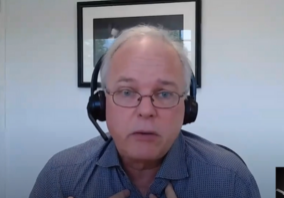Sen. Sherrod Brown, lead sponsor of The Big Oil Windfall Profits Tax Act
“Big oil companies
They’re Not Sending Their Best
To learn more about Epsilon Theory and be notified when we release new content sign up here. You’ll receive an email every week and your information will never be shared with anyone else.
Continue the discussion at the Epsilon Theory Forum
6 more replies
The Latest From Epsilon Theory
DISCLOSURES
This commentary is being provided to you as general information only and should not be taken as investment advice. The opinions expressed in these materials represent the personal views of the author(s). It is not investment research or a research recommendation, as it does not constitute substantive research or analysis. Any action that you take as a result of information contained in this document is ultimately your responsibility. Epsilon Theory will not accept liability for any loss or damage, including without limitation to any loss of profit, which may arise directly or indirectly from use of or reliance on such information. Consult your investment advisor before making any investment decisions. It must be noted, that no one can accurately predict the future of the market with certainty or guarantee future investment performance. Past performance is not a guarantee of future results. Statements in this communication are forward-looking statements. The forward-looking statements and other views expressed herein are as of the date of this publication. Actual future results or occurrences may differ significantly from those anticipated in any forward-looking statements, and there is no guarantee that any predictions will come to pass. The views expressed herein are subject to change at any time, due to numerous market and other factors. Epsilon Theory disclaims any obligation to update publicly or revise any forward-looking statements or views expressed herein. This information is neither an offer to sell nor a solicitation of any offer to buy any securities. This commentary has been prepared without regard to the individual financial circumstances and objectives of persons who receive it. Epsilon Theory recommends that investors independently evaluate particular investments and strategies, and encourages investors to seek the advice of a financial advisor. The appropriateness of a particular investment or strategy will depend on an investor’s individual circumstances and objectives.
This commentary is being provided to you as general information only and should not be taken as investment advice. The opinions expressed in these materials represent the personal views of the author(s). It is not investment research or a research recommendation, as it does not constitute substantive research or analysis. Any action that you take as a result of information contained in this document is ultimately your responsibility. Epsilon Theory will not accept liability for any loss or damage, including without limitation to any loss of profit, which may arise directly or indirectly from use of or reliance on such information. Consult your investment advisor before making any investment decisions. It must be noted, that no one can accurately predict the future of the market with certainty or guarantee future investment performance. Past performance is not a guarantee of future results. Statements in this communication are forward-looking statements. The forward-looking statements and other views expressed herein are as of the date of this publication. Actual future results or occurrences may differ significantly from those anticipated in any forward-looking statements, and there is no guarantee that any predictions will come to pass. The views expressed herein are subject to change at any time, due to numerous market and other factors. Epsilon Theory disclaims any obligation to update publicly or revise any forward-looking statements or views expressed herein. This information is neither an offer to sell nor a solicitation of any offer to buy any securities. This commentary has been prepared without regard to the individual financial circumstances and objectives of persons who receive it. Epsilon Theory recommends that investors independently evaluate particular investments and strategies, and encourages investors to seek the advice of a financial advisor. The appropriateness of a particular investment or strategy will depend on an investor’s individual circumstances and objectives.










God help me, I voted for that man once in my life.
I do like that the solution to high prices is adding a tax, which as we all know is how you bring costs down. When someone like Brown does something like this you have to play ‘Stupid or Liar?’ and figure out what caused him to do this. I agree with your assessment, he’s not stupid. I met him a lifetime ago in a small group setting and he seemed like he wasn’t a drooling vegetable. (The same cannot be said for one of our former governors, a man that to this day I still rank as #1 in the dumb-to-job-importance ratio)
Great post. As I worked for Big Oil for 2 decades, I have a definite bias where US policy and politicians are concerned. Rather than bang on about it, I’ll instead recommend John Hofmeister’s book: Why We Hate Oil Companies: Straight Talk from an Energy Insider.
I have not read it but will.
I met Mr. Hofmeister in 2006 when he was RDS’s country President. At a round table discussion, he asked our thoughts on public opinion of our industry here in the US. He noted I had been quiet so he asked me directly, “What do you think?” I answered:
"The public’s negative opinion of our industry is largely our fault because of the way we handled the 1970’s Windfall Profit scandal. Our entire industry quietly and silently didn’t engage with the American public in a thoughtful way in the following decades.
Instead, we chose not to educate citizens on all the science and engineering that has lead to the breakthroughs needed to create the quality of life, high standard of living, and all the products we love derived from the hydrocarbon molecule chain. We chose not to educate the public about all the private monies our industry donates to fund STEM education in universities across this nation, about the taxes we pay, about the size of our collective payroll, and all the good work our employees do in their communities.
So into that information vacuum we allowed with our silence, others filled it with their misinformation, mischaracterizations, and politically driven narratives. Oil is Bad.
Today the average American hasn’t a clue what would happen if we waved a magic wand, stripped everything made from/with hydrocarbon out of their lives. And to a certain extent, that’s on us."
Mr. Hofmeister nodded, “Good summary.” About a yr later, a colleague texted me: Mr. H is quoting you in this video.
I think not. Mr. H was a highly intelligent, well read gentlemen–I didn’t say anything he wasn’t already thinking, the reason he called me out was to test if I would say what was written on my face. Am looking forward to reading his book.
At the retail level, gasoline margins compress as the price of oil rises as retailers try and stay competitive. When oil prices fall, retail margins expand for a period of time.
When I say they’re not sending their best, the they is us.
It is also on us when we don’t do the tiniest bit of price comparison/shopping. Especially given how much easier it is with the internet.
When the difference in retail prices is $1 a gallon from gas stations (same brand names) less than 10 minutes from each other in a large urban area, NO ONE should be going to the higher priced gas station. Yet it is busy and profitable. And so the gas station 10 minutes away pretty quickly raises their price because their competition has gotten away with it and they realize the market (aka us) will bear it. And thus a competitive cost spiral is born.
Good article, and especially today it makes me want to look harder at energy stocks and BTFD.
Strong Emperor Palpatine vibes from the photo at the beginning of the article.
You can buy all the ones I’m selling. But I also spent seven years in the industry, so I’m a natural skeptic.
I think being alive the last few years alone has made skeptics and cynics out of all of us
A view from the UK: I would like to see a requirement for anyone standing for office, at any level, to have worked in a private company, not the civil service, for a minimum of 5 years before they are eligible. Preferably no one with a degree in political science should be let near the wheels of power, unless they met the above minimum criteria.
In my youth, it was rare to have professional politicians. Conservatives were farmers, lawyers, bankers, company directors. Labour had Union officials, and a smattering of private business owners or employees. And almost to a man or woman they represented the constituency in which they lived. They knew the local people and the issues which mattered to them.
The rise of the political wannabe who read PPE at Oxford, then joins into a Think Tank, then becomes a Special Adviser (SpAd) before being parachuted into a safe seat, has led to a decline in the quality of debate and leadership. And a hankering after big show-off projects like Net Zero, which guarantee a decline in living standards for the average family. I’m thinking here of BoJo, my Prime Minister, a man of staggering incompetence and a serial liar who can’t keep it in his pants. But he leads the party of which I am a member …
When did Government become about virtue signalling and not about trying to better the lives of the people of your country? How can we get back to a choice of potential politicians who have real world experience? One way would be as I suggested at the start. But I’m not holding my aged breath.
This article is depressing.
“Writing and passing actual legislation is no longer the point of American government. The point of American government is to remain in American government, and the way you do that is to tell a good story.”
How do we change the incentives so actually governing is the point again? I would much rather have a functioning society than the interpretive dance politics we have now.